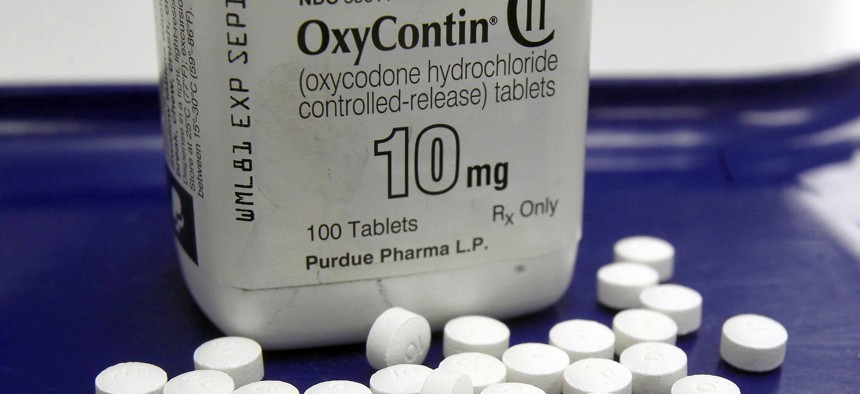‘An Insult’: Attorneys General Slam Purdue Restructuring Plan

This Feb. 19, 2013, file photo shows OxyContin pills arranged for a photo at a pharmacy in Montpelier, Vt. AP Photo/Toby Talbot
Under the proposal filed this week, the OxyContin manufacturer would pay $4.25 billion to states, municipalities and others.
Purdue Pharma filed a bankruptcy restructuring plan that would require the Sackler family to pay $4.25 billion to states, municipalities and others to reimburse them for costs associated with the opioid epidemic.
Although the plan increases the amount that Purdue’s owners, the Sackler family, would have to pay by $1.5 billion, a coalition of state attorneys general immediately rejected the plan, saying it did not go far enough.
“We are disappointed in this plan,” said South Carolina Attorney General Josh Stein in a statement on behalf of 24 attorneys general. “While it contains improvements over the proposal that Purdue announced and we rejected in September 2019, it falls short of the accountability that families and survivors deserve.”
The plan, which was in federal court late Monday night and would still have to be approved, would dissolve the company and establish a private corporation run by independent managers selected by the states and local governments that sued Purdue. That corporation would continue to manufacture some opioid drugs but would diversify its products to also include medications that can reverse opioid overdoses and alleviate opioid addiction.
About $500 million would be paid in cash up front to settle injury claims related to the opioid epidemic, while additional payments would be made over the next decade.
Massachusetts Attorney General Maura Healey slammed the terms of the deal and said she intends to offer amendments.
“It's not a settlement, it's an insult,” Healey said. “To give the Sacklers a family legacy, Purdue proposed that the government take over the OxyContin business after the bankruptcy and run it as a public trust. Massachusetts sued Purdue for killing our residents. I want it shut down.”
Lawsuits brought against Purdue say the company’s marketing and distribution of prescription drugs fueled the opioid crisis, which resulted in more than 400,000 deaths over 20 years.
In a statement outlining the terms of the plan, Purdue said the Sacklers would have no involvement in the new company and the deal would end their involvement in pharmaceutical companies.
“The company has worked closely with a broad and diverse group of stakeholders to guarantee that billions of dollars will be used exclusively for abatement purposes and not diverted elsewhere,” said Steve Miller, chairman of Purdue’s board of directors.
Stein’s office said the deal should be revised to include additional money for states to help address the opioid crisis. As negotiations are ongoing, a spokeswoman for his office said she could not provide a dollar amount that the attorney general would deem satisfactory.
Other changes requested by Stein’s office include a prompt wind-down of Purdue that “does not excessively entangle it with states and other creditors,” and transparency in the form of document disclosures by the company.
Purdue agreed to an $8.3 billion settlement with the Department of Justice last year. The Sackler family paid $225 million in civil penalties, and while family members were not criminally charged, prosecutors reserved the right to pursue criminal charges later. The ongoing bankruptcy case and disagreements among state and local governments over how to use opioid settlement funds have hamstrung efforts to distribute awards.
McKinsey and Co., which worked with Purdue to market Oxycontin, agreed earlier this year to pay $573 million to resolve investigations into its role promoting prescription opioid sales for drug companies.
States that sued Purdue have said the company owes them as much as $2 trillion to address its role in fueling America’s opioid epidemic.
Andrea Noble is a staff correspondent with Route Fifty.
NEXT STORY: New Connecticut Law Will Ban Discrimination Based On Hairstyles





